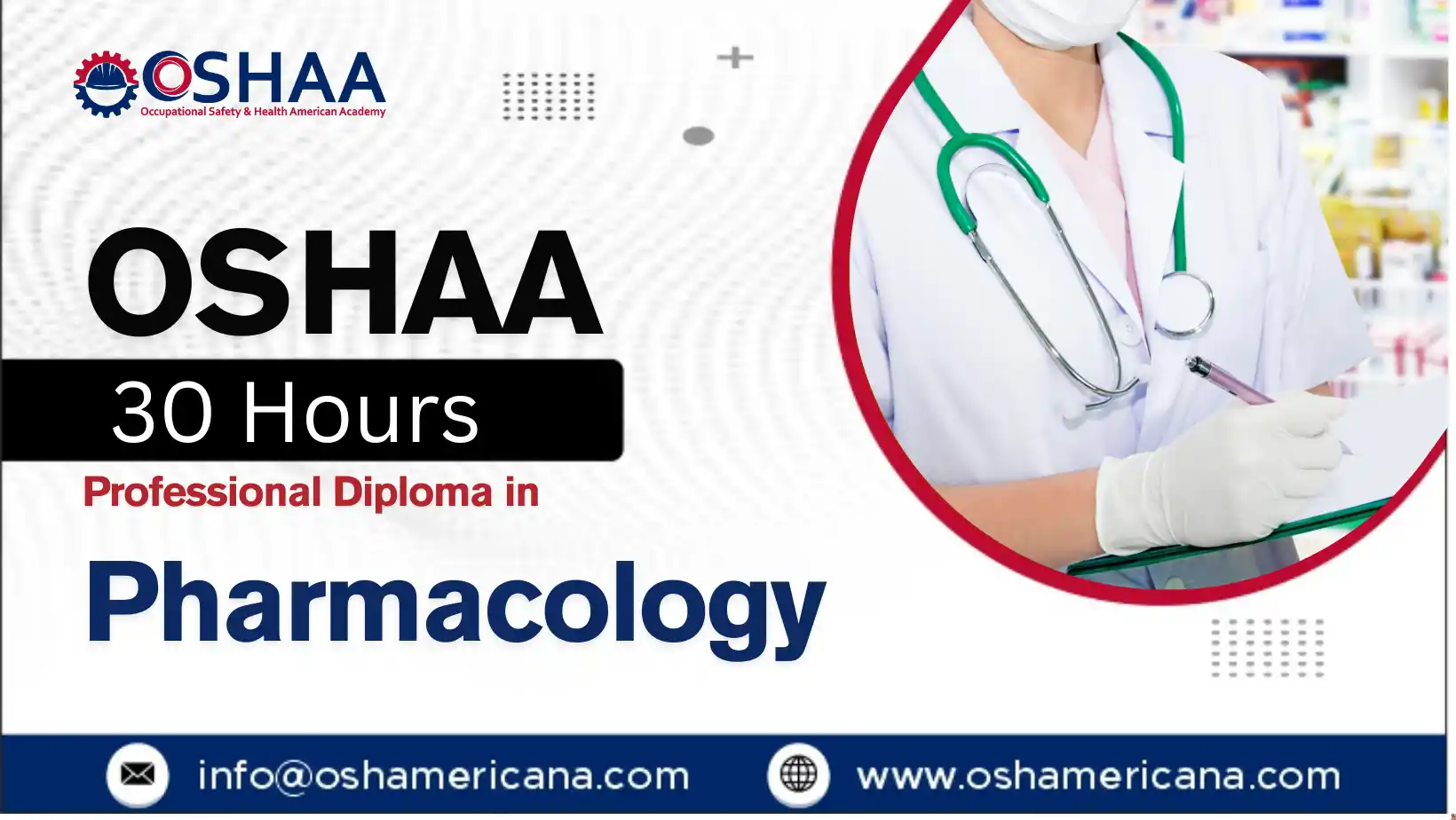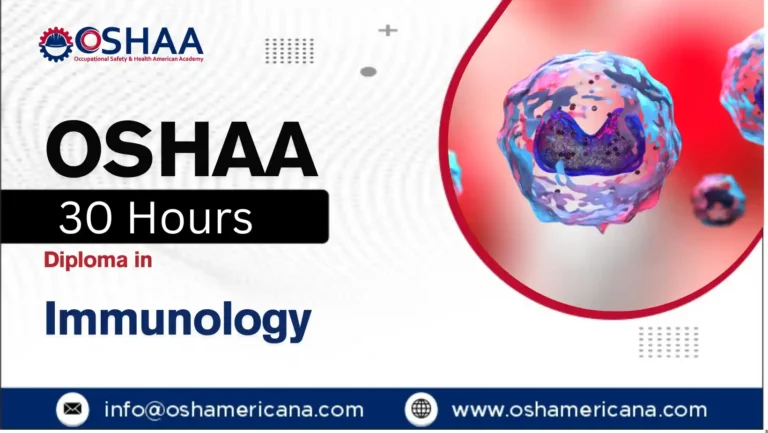Diploma in Pharmacology – Master Drug Actions and Therapeutics
Pharmacology is a fundamental discipline in health sciences, exploring how drugs interact with the body to influence health outcomes. With the increasing demand for safe, accurate, and effective medication use, there is a growing need for professionals who understand pharmacological principles. The OSHAA 30-Hours Professional Diploma in Pharmacology is a focused, practical programme designed to provide participants with a strong foundation in the science of drugs and their therapeutic applications.
This diploma offers an in-depth study of key pharmacological concepts, making it ideal for healthcare workers, aspiring medical professionals, and individuals pursuing careers in life sciences. The programme bridges the gap between theory and clinical practice, enabling participants to understand drug mechanisms, side effects, dosage principles, and patient safety considerations.
Delivered over 30 guided hours, the course equips learners to confidently engage with pharmacology in professional or academic settings. The curriculum is aligned with current industry standards and scientific advancements, ensuring participants gain relevant, up-to-date knowledge. By completing this diploma, learners develop the competence to apply pharmacological principles responsibly, understand drug interactions, and support safe and effective patient care in modern healthcare environments.
OSHAA 30-Hours Professional Diploma in Pharmacology
Study Units
Learning Outcomes
Introduction to Pharmacology and Drug Classification (3 Hours)
- Define pharmacology and its role in healthcare and medicine
- Identify major drug categories and their general therapeutic uses
- Understand key terminology related to drug classification and naming conventions
Fundamentals of Pharmacokinetics and Pharmacodynamics (4 Hours)
- Explain the principles of drug absorption, distribution, metabolism, and excretion
- Describe how drugs interact with receptors and produce therapeutic effects
- Differentiate between pharmacokinetics and pharmacodynamics in clinical contexts
Drug Administration Routes and Absorption Mechanisms (5 Hours)
- Identify common routes of drug administration and their characteristics
- Understand how route of administration affects absorption and onset of action
- Assess the advantages and limitations of each administration method
Distribution, Metabolism, and Elimination of Drugs (3 Hours)
- Describe how drugs are transported and distributed within the body
- Explain hepatic metabolism and the concept of the first-pass effect
- Understand how drugs are eliminated through renal and non-renal pathways
Therapeutic Effects, Side Effects, and Adverse Reactions (4 Hours)
- Distinguish between therapeutic effects, side effects, and toxic reactions
- Identify common adverse reactions associated with major drug groups
- Understand the importance of monitoring and managing drug-related effects
Dosage Calculations and Drug Interactions (5 Hours)
- Perform basic drug dosage calculations using standard formulas
- Recognise factors that influence dosage such as age, weight, and organ function
- Understand potential drug-drug, drug-food, and drug-disease interactions
Central Nervous System Pharmacology (3 Hours)
- Identify key drug classes affecting the central nervous system
- Understand the mechanisms and uses of analgesics, sedatives, and antidepressants
- Explain the impact of CNS drugs on mood, cognition, and motor function
Cardiovascular and Respiratory Pharmacology (3 Hours)
- Describe the pharmacological management of common cardiovascular conditions
- Identify drug classes used in the treatment of hypertension, angina, and heart failure
- Understand the use of bronchodilators and anti-inflammatory agents in respiratory care
Course Benefits – OSHAA 30-Hours Professional Diploma in Pharmacology
The OSHAA 30-Hours Professional Diploma in Pharmacology offers a solid foundation in the science of drug action, equipping participants with essential knowledge and skills applicable in a wide range of healthcare, clinical, and support roles. This professionally designed course provides both academic understanding and practical insight, enhancing the competence and confidence of participants working with or around medications.
Comprehensive Understanding of Pharmacological Principles
Participants gain a structured and thorough knowledge of how drugs interact with the body, covering pharmacokinetics, pharmacodynamics, and therapeutic classifications in detail.
Practical Application in Healthcare Settings
The course equips participants with the ability to interpret drug-related information, calculate dosages accurately, and understand safe administration methods, supporting real-world application in medical and allied health environments.
Improved Awareness of Safety and Risk Management
Participants learn how to recognise side effects, avoid adverse reactions, and manage drug interactions, promoting safer practices and more informed decision-making.
Enhanced Communication and Documentation Skills
By developing a strong pharmacological vocabulary, participants are better prepared to communicate effectively with healthcare professionals and contribute to patient-centred care plans.
Preparation for Further Study and Specialisation
This diploma serves as a foundation for progression into advanced studies in nursing, pharmacy, biomedical science, or clinical research, opening the door to professional growth.
Career Support for Allied and Support Roles
The course is particularly valuable for participants in healthcare assistant, pharmaceutical sales, or administrative roles who need to understand drug protocols and safety standards.
Increased Confidence in Clinical Environments
With a balanced focus on scientific understanding and practical relevance, participants are empowered to support medication-related decisions with professionalism and confidence.
Recognition of Professional Development
Successful completion of the diploma demonstrates a commitment to learning and continuous improvement, strengthening a participant’s qualifications and employability in competitive healthcare sectors.
The OSHAA 30-Hours Professional Diploma in Pharmacology is designed for participants seeking to build foundational knowledge of drug action, safety, and therapeutic application. It is suitable for a wide range of individuals involved in healthcare, clinical support, and life sciences, or those intending to pursue further education in related fields.
This course is ideal for:
- Participants working in healthcare support roles who require an understanding of medication use and safety
- Individuals preparing for further study in nursing, pharmacy, medicine, or biomedical sciences
- Participants involved in pharmaceutical sales, research support, or health administration
- Care providers or clinical assistants who wish to enhance their knowledge of drug effects and interactions
- Individuals seeking to improve their understanding of dosage calculations, drug classifications, and patient monitoring
- Those with a general interest in pharmacology as a component of health and medical education
This course welcomes participants with varying levels of prior knowledge and is particularly beneficial for those seeking an accessible, professionally aligned introduction to pharmacological principles.







